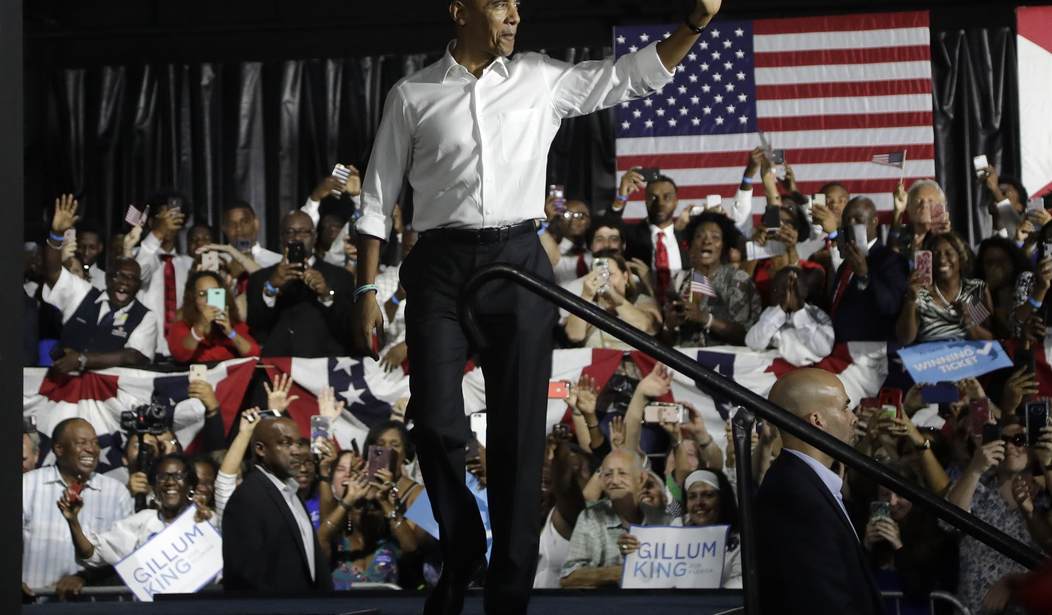Whatever happened to Barack Obama?
For a while there, no modern figure was supposed to be as consequential. It's difficult to describe the hype in the early days of the Obama era. Time, Newsweek and countless deep thinkers cast him as a 21st century Lincoln or FDR. Some literally saw a messianic figure -- "The One," in Oprah Winfrey's words. Self-help guru Deepak Chopra said Obama represented a "quantum leap in American consciousness."
George Lucas speculated that he might even be a Jedi.
It was a global phenomenon. In a move that embarrassed Obama himself, the Nobel Committee gave him a Peace Prize on spec -- i.e. in anticipation of what they were sure he would do. A leading Danish newspaper editorialized "Obama is, of course, greater than Jesus."
Obama himself set his sights lower; he wanted to be the Democrats' Ronald Reagan. And for a time, it seemed to many that he'd succeeded. As late as April of 2017, CNN's Fareed Zakaria said, "Obama aspired to be a transformational president, like Reagan. At this point, it's fair to say that he has succeeded."
But this proved to be a mirage. As National Review's Ramesh Ponnuru observed in 2017, Obama left office almost as popular as Reagan, but when Reagan departed for California, he left his party stronger than when he found it, holding more elected offices at the federal and state level. And the public felt better about the direction of the country as well. When Obama left office, nearly 1,000 Democrats lost their jobs, and the GOP was better positioned than at any time since the 1920s.
Some analysts plausibly argue that these statistics are unfairly inflated because they're pegged to the large coattails Obama had in 2008. Even so, it demonstrates that Obama failed by his own standard in so far as transformational presidents expand and entrench their parties the way FDR and Reagan did.
In fairness, Reagan and FDR had an advantage Obama did not: They were
Recommended
succeeded by allies. Since so much of what presidents do can be reversed by the next president, particularly when done by executive order -- as Obama did for most of his presidency -- it takes a new, friendly, replacement to solidify a presidential legacy. Donald Trump reversed many of Obama's policies with a stroke of a pen (just as a Democratic successor would do to Trump's).
Still, it was hard to appreciate the extent of Obama's incredible shrinking presidency until the recent Democratic presidential debates. Much of the post-debate punditry has focused on the fight between the handful of moderates, led by Obama's Vice President Joe Biden, and the far more numerous left-wingers, who attacked numerous Obama policies from the left, most notably his signature Affordable Care Act, AKA Obamacare, but also his immigration and economic policies.
Attacks on the Reagan legacy on the right are lamentably increasing among some intellectuals on the right, but we've never seen anything remotely like this in a GOP presidential debate. Attacking Reagan is still risky for a Republican politician, and he left office over three decades ago.
The Democrats' migration to the left is not merely a story of ideological or intellectual transformation, though it is that, it's also the direct consequence of Obama's presidency. However we're supposed to measure the total number of Democratic losses under Obama, the important part isn't the quantity of the loss, but the quality.
The ranks of moderate and conservative Democrats were disproportionately hollowed out under Obama, while Democrats in deep blue liberal areas were emboldened to move even further left. (Trump has had a similar effect on the right, decimating the moderate wing of the GOP while intensifying the partisanship of conservatives in safe red areas).
The big-name Democrats who survived Obama are more concerned by primary challenges to their left than general election threats from their right. As a result, they have a hard time talking to audiences that don't already agree with them on the big questions.
Those ultra-liberal politicians -- Warren, Sanders, et al -- now drive the party to such a degree that House Speaker Nancy Pelosi is now seen as a moderating force on the Democrats. The moderates in the debates are like refugees of a wing of a party that has shrunk to a feather. Only Biden stands as a formidable figure, because of his time at Obama's side.
And now even that is turning into a liability, at least on the debate stage.

























Join the conversation as a VIP Member